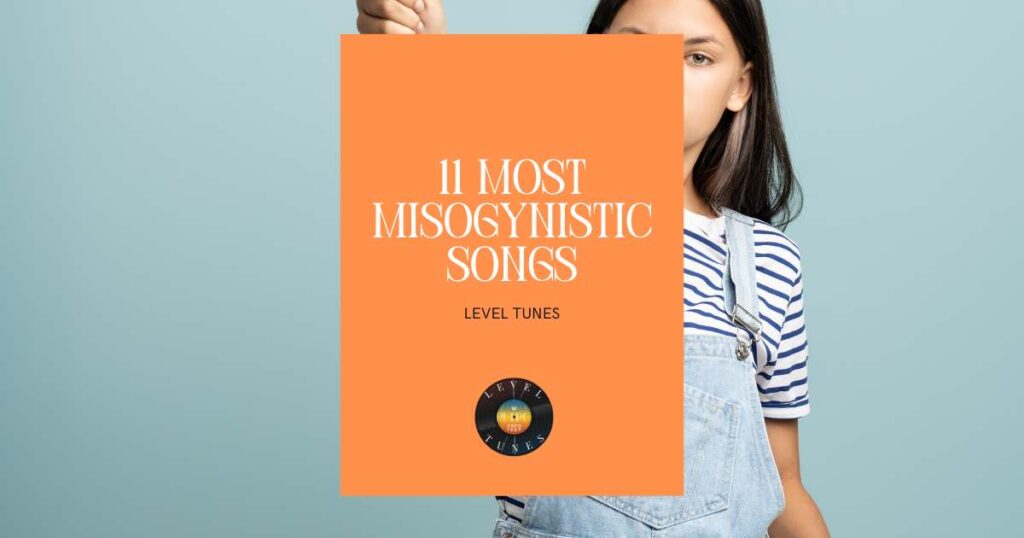11 Most Misogynistic Songs: 11 Shocking Songs
Hey there, music lovers and fellow DJs! It’s TBone here from Level Tunes, ready to dive into a topic that’s as intriguing as it is important. Today, we’re exploring the 11 most misogynistic songs in the music industry.
Now, you might wonder, why focus on such a controversial topic?
Well, as a DJ and an avid music fan, I believe it’s crucial to understand the different layers in the music we love and share.
This list isn’t about shaming artists or genres; it’s about bringing awareness and sparking conversations around the often-overlooked themes in popular tracks.
So, let’s embark on this journey together, with open minds and a passion for great music!
Here are the most misogynistic songs that you can check out:
List Of Most Misogynistic Songs
Most misogynistic songs in a list format:
“Blurred Lines” by Robin Thicke
Album: Blurred Lines
Year: 2013
Label: Star Trak, Interscope
“Blurred Lines” by Robin Thicke, featuring Pharrell Williams and T.I., sparked a lot of controversies. Released in 2013 under the Star Trak and Interscope labels, the song was criticized for lyrics that seemed to blur the lines of consent. The catchy beat overshadowed the problematic message for many, but it opened up discussions about how pop music portrays relationships. Despite its success, “Blurred Lines” became a case study in how lyrics can be interpreted and the importance of understanding the impact of words in music.
“Under My Thumb” by The Rolling Stones
Album: Aftermath
Year: 1966
Label: Decca, London
The Rolling Stones’ “Under My Thumb,” from their 1966 album “Aftermath,” is an iconic rock track with a troubling undertone. Released by Decca and London Records, the song describes a relationship where the power dynamics are heavily skewed in favor of the male narrator. Mick Jagger’s charismatic delivery and the band’s rhythmic expertise couldn’t mask the lyrics that depicted control over a woman. This song is often cited in discussions about the portrayal of women in rock music of the 60s.
“Stan” by Eminem
Album: The Marshall Mathers LP
Year: 2000
Label: Aftermath, Interscope
Eminem’s “Stan,” from his 2000 album “The Marshall Mathers LP,” is a masterpiece in storytelling, but it also contains deeply misogynistic elements. Released by Aftermath and Interscope, this song narrates the story of an obsessed fan, with dark and violent references towards women. Eminem, known for his controversial lyrics, uses this song to explore the dangerous side of fandom and mental health, but it also inadvertently sheds light on how women are often portrayed in hip-hop.
“Used to Love Her” by Guns N’ Roses
Album: G N’ R Lies
Year: 1988
Label: Geffen
Guns N’ Roses’ “Used to Love Her” from their 1988 album “G N’ R Lies” is a song that raised eyebrows. Released under Geffen Records, it’s a song with dark humor, describing a man’s feelings about killing his girlfriend. While the band claimed it was a satirical take on a bad relationship, the lyrics were criticized for their violent and misogynistic tone. This song exemplifies the fine line between satire and harmful messaging in rock music.
“Kim” by Eminem
Album: The Marshall Mathers LP
Year: 2000
Label: Aftermath, Interscope
Another controversial track by Eminem is “Kim,” also from “The Marshall Mathers LP.” This intensely personal song, released by Aftermath and Interscope, details a violent and abusive relationship. It’s a raw portrayal of anger and domestic violence, which, while aiming to be a cathartic expression of personal pain, ended up depicting graphic misogyny. “Kim” sparked debates about the impact of such visceral storytelling in music and its influence on listeners.
“Smack My Bitch Up” by The Prodigy
Album: The Fat of the Land
Year: 1997
Label: XL
The Prodigy’s “Smack My Bitch Up,” from their 1997 album “The Fat of the Land,” released by XL Recordings, is one of the most controversial songs of the 90s. With its aggressive title and lyrics, it was accused of promoting violence against women. The band argued that the song was misunderstood and meant to be provocative rather than taken literally. Despite its pulsating electronic beat and popularity, it sparked a significant discussion about the portrayal of violence in music.
“Money for Nothing” by Dire Straits
Album: Brothers in Arms
Year: 1985
Label: Vertigo, Warner Bros.
Dire Straits’ “Money for Nothing,” from their 1985 album “Brothers in Arms” and released by Vertigo and Warner Bros., is known for its distinctive guitar riff and satirical lyrics. The song, narrating the perspective of a working-class man commenting on the music industry, includes derogatory terms towards women. While Mark Knopfler, the lead singer, argued that the song was a character study and not reflective of his views, it raised questions about the responsibility of artists in portraying characters with misogynistic attitudes.
“Brown Sugar” by The Rolling Stones
Album: Sticky Fingers
Year: 1971
Label: Rolling Stones, Atlantic
“Brown Sugar” by The Rolling Stones, featured on their 1971 album “Sticky Fingers” and released under the Rolling Stones and Atlantic labels, is a classic rock anthem with deeply problematic themes. The song, with its catchy guitar riffs and energetic performance, veils its references to slavery, sexual violence, and racism. Mick Jagger’s charismatic voice can’t disguise the disturbing nature of the lyrics, which have been widely criticized for their portrayal of women, particularly women of color. It’s a stark reminder of how historical context and social awareness can change the perception of a song over time.
“Me So Horny” by 2 Live Crew
Album: As Nasty As They Wanna Be
Year: 1989
Label: Luke Records
“Me So Horny” by 2 Live Crew, from their 1989 album “As Nasty As They Wanna Be,” released by Luke Records, is infamous for its explicit content and misogynistic lyrics. The song, which samples dialogue from a film, became a symbol of the debate over obscenity in music. Its overtly sexual lyrics and portrayal of women were criticized for objectifying and degrading women, leading to discussions about the impact of explicit content in hip-hop on societal attitudes towards women.
“Bitches Ain’t Shit” by Dr. Dre
Album: The Chronic
Year: 1992
Label: Death Row, Interscope
Dr. Dre’s “Bitches Ain’t Shit” from the 1992 album “The Chronic,” released under Death Row and Interscope, is a track that has garnered criticism for its demeaning language towards women. This song, featuring Snoop Dogg, Daz Dillinger, and others, is a prominent example of misogyny in early ’90s hip-hop. While it reflects the gritty reality of the artists’ experiences and the culture of the time, the derogatory portrayal of women in the lyrics has been a point of contention in discussions about hip-hop’s influence on societal perceptions of women.
“It Wasn’t Me” by Shaggy
Album: Hot Shot
Year: 2000
Label: MCA
Shaggy’s hit song “It Wasn’t Me,” from the 2000 album “Hot Shot” and released by MCA Records, is a catchy reggae fusion track that tells the story of a man caught cheating by his partner. The song’s narrative, where the protagonist is advised to deny his infidelity despite overwhelming evidence, has been criticized for promoting dishonesty and a lack of respect towards women in relationships. While it remains a popular party anthem, its message about relationships and treatment of women has been questioned.
Fun Facts: Most Misogynistic Songs
“Blurred Lines” by Robin Thicke
- The Music Video Controversy: The music video for “Blurred Lines” featured models in minimal clothing, which intensified the controversy around the song. It led to a version with fully clothed models, but the original version remains more popular.
- Legal Battle: The song faced a high-profile copyright infringement lawsuit from the family of Marvin Gaye, claiming it copied Gaye’s 1977 hit “Got to Give It Up.” Thicke and Williams were ordered to pay millions in damages.
“Under My Thumb” by The Rolling Stones
- Live Performance Incident: During a performance of “Under My Thumb” at the Altamont Free Concert in 1969, a member of the audience was fatally stabbed, overshadowing the song with a tragic association.
- Change in Perspective: Mick Jagger, in later years, reflected on the song’s lyrics, acknowledging their chauvinistic nature and hinting at how his views on women have evolved since the song’s release.
“Stan” by Eminem
- Introduction of a Word: The song “Stan” led to the coining of the term “stan,” now widely used in popular culture to describe an overly obsessed fan. This term was later added to the Oxford English Dictionary.
- Cameo by Dido: The song samples Dido’s track “Thank You.” Dido appeared in the music video as Stan’s girlfriend, adding to the song’s narrative depth.
“Used to Love Her” by Guns N’ Roses
- Satirical Origins: Despite its controversial lyrics, “Used to Love Her” was claimed by the band to be a satirical response to incessant complaints about girlfriends and was not meant to be taken literally.
“Kim” by Eminem
- Personal Pain: “Kim” is an intensely personal song for Eminem, reflecting the tumultuous relationship he had with his then-wife, Kim Scott. It’s considered one of his most raw and emotional tracks.
“Smack My Bitch Up” by The Prodigy
- Music Video Impact: The music video for “Smack My Bitch Up,” directed by Jonas Åkerlund, was notable for its first-person perspective and twist ending. It was banned by several networks due to its graphic content.
“Money for Nothing” by Dire Straits
- Groundbreaking Animation: The music video for “Money for Nothing” was one of the first to use computer-animated human characters and was considered groundbreaking at the time of its release.
“Brown Sugar” by The Rolling Stones
- Controversial Performances: The Rolling Stones have occasionally dropped “Brown Sugar” from their live performances, acknowledging its controversial lyrics and the changing attitudes towards such content.
“Me So Horny” by 2 Live Crew
- Legal Battles: “Me So Horny” was at the center of a legal battle over obscenity in music, leading to a Supreme Court case that was significant in shaping American First Amendment law regarding music censorship.
“Bitches Ain’t Shit” by Dr. Dre
- Influential in Hip-Hop: Despite its controversial nature, “Bitches Ain’t Shit” has been influential in hip-hop, inspiring numerous covers and adaptations by other artists.
“It Wasn’t Me” by Shaggy
- Accidental Hit: Shaggy has mentioned in interviews that “It Wasn’t Me” was never intended to be a single and was added to the album almost as an afterthought, only to become one of his biggest hits.
And there you have it, folks – a dive into some of the most controversial songs in music history. While they’ve rocked the charts, they’ve also rocked the boat, reminding us that music isn’t just melodies and beats; it’s a reflection of our culture and attitudes. Keep listening, keep questioning!
Thanks for reading.
TBone




